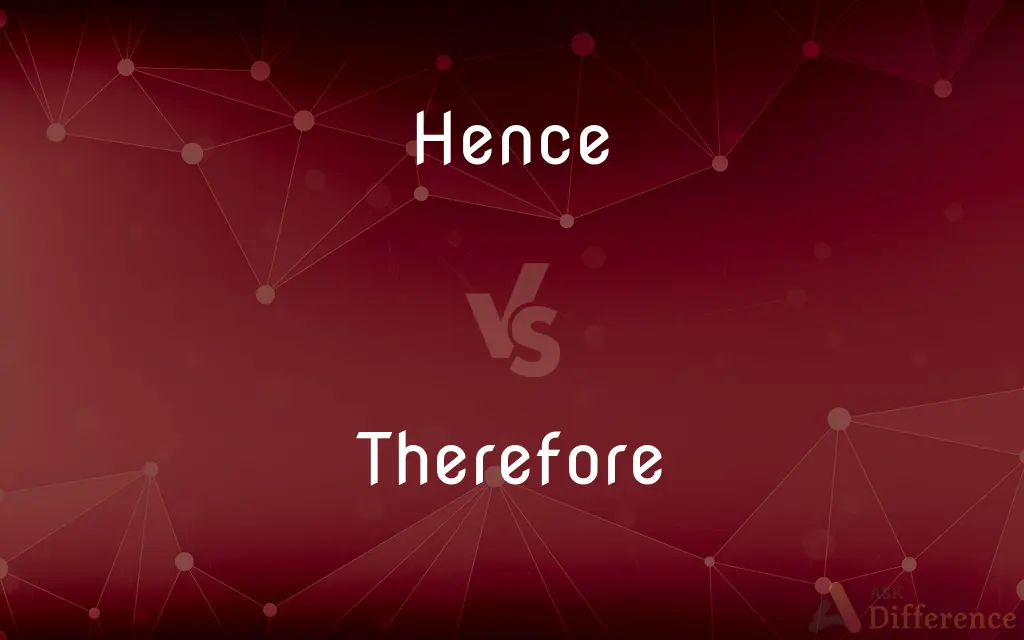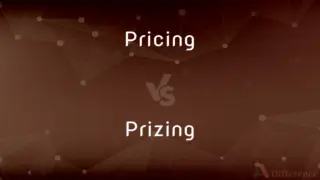Hence vs. Therefore — What's the Difference?
Edited by Tayyaba Rehman — By Fiza Rafique — Updated on October 25, 2023
Hence often implies a cause-and-effect relation with a forward-looking perspective, while therefore denotes a logical conclusion or result.

Difference Between Hence and Therefore
Table of Contents
ADVERTISEMENT
Key Differences
Hence is a versatile term often used to indicate a direct consequence or outcome based on a prior event or situation. Therefore, by contrast, commonly acts as a more formal connector that draws a conclusion based on provided premises.
When utilizing "hence" in casual or poetic settings, it may convey a sense of "from this point in time" or "from this place." On the other hand, "therefore" is more strictly used to introduce the resulting clause of a logical argument.
In mathematics or formal logic, "therefore" is frequently adopted to signal the culmination of a proof or logical sequence. "Hence" can serve a similar role, but it carries a slightly more casual tone and might not be the preferred choice in strictly academic contexts.
Historically, "hence" has also been employed in contexts meaning "away from this place" or "away from this time." Therefore doesn't share this spatial or temporal usage and is more constrained to drawing conclusions.
In day-to-day conversation, both "hence" and "therefore" can be used to bridge cause and effect, but the choice often boils down to the speaker's preference or the formality of the situation.
ADVERTISEMENT
Comparison Chart
Primary Usage
Cause-and-effect with a forward-looking perspective.
Draws a logical conclusion based on premises.
Formality
Can be less formal.
More formal, especially in academic contexts.
Temporal/Spatial Aspect
Historically used to indicate "from this time/place."
Doesn't convey temporal or spatial meanings.
Common Contexts
Casual conversation, poetic writings.
Logical arguments, mathematical proofs, formal writings.
Syntactic Position
Often positioned at the start or end of a sentence.
Commonly placed at the beginning of the resulting clause.
Compare with Definitions
Hence
As a consequence or result of.
She was late, hence she missed the beginning.
Therefore
For that reason.
He was ill and therefore could not come.
Hence
From this time or point on.
Ten days hence, we'll meet again.
Therefore
As a necessary inference or deduction.
The evidence is clear; therefore, the accused is guilty.
Hence
Away from this place.
He moved hence to another state.
Therefore
Consequently or as a result.
The road was icy; therefore, driving was dangerous.
Hence
For this reason; therefore
Handmade and hence expensive.
Therefore
Used to introduce a logical conclusion.
All mammals are animals; therefore, a dog is an animal.
Hence
From this source
They grew up in the Sudan.
Hence their interest in Nubian art.
Therefore
To infer based on provided information.
She didn't study; therefore, she failed the test.
Hence
From this time; from now
A year hence it will be forgotten.
Therefore
For that reason or cause; consequently or hence.
Hence
From this place; away from here
Get you hence!.
Therefore
(conjunctive) Consequently, by or in consequence of that or this cause; referring to something previously stated.
Traditional values will always have a place. Therefore, they will never lose relevance.
Hence
From this life.
Therefore
For that; for it (in reference to a previous statement)
Hence
(archaic) from here, from this place, away
I'm going hence, because you have insulted me.
Get thee hence, Satan!
Therefore
For that or this reason, referring to something previously stated; for that.
I have married a wife, and therefore I can not come.
Behold, we have forsaken all, and followed thee; what shall we have therefore?
Hence
From the living or from this world
After a long battle, my poor daughter was taken hence.
Therefore
Consequently; by consequence.
He blushes; therefore he is guilty.
Hence
(of a length of time) in the future from now
A year hence it will be forgotten.
Therefore
(used to introduce a logical conclusion) from that fact or reason or as a result;
Therefore X must be true
The eggs were fresh and hence satisfactory
We were young and thence optimistic
It is late and thus we must go
The witness is biased and so cannot be trusted
Hence
(conjunctive) as a result; therefore, for this reason
I shall go to Japan and hence will not be here in time for the party.
The purse is handmade and hence very expensive.
Therefore
As a consequence;
He had good reason to be grateful for the opportunities which they had made available to him and which consequently led to the good position he now held
Hence
(obsolete) Go away! Begone!
"...Hence! and bestow your dead
Where no wrong against him cries!"
Hence
To utter "hence!" to; to send away.
Hence
To depart; to go away.
Hence
From this place; away.
Arise, let us go hence.
I will send thee far hence unto the Gentiles.
Hence
From this time; in the future; as, a week hence.
Hence
From this reason; therefore; - as an inference or deduction.
Hence, perhaps, it is, that Solomon calls the fear of the Lord the beginning of wisdom.
Hence
From this source or origin.
All other faces borrowed henceTheir light and grace.
Whence come wars and fightings among you? Come they not hence, even of your lusts?
An ancient author prophesied from hence.
Expelled from hence into a worldOf woe and sorrow.
Hence
To send away.
Hence
(used to introduce a logical conclusion) from that fact or reason or as a result;
Therefore X must be true
The eggs were fresh and hence satisfactory
We were young and thence optimistic
It is late and thus we must go
The witness is biased and so cannot be trusted
Hence
From this place;
Get thee hence!
Hence
From this time;
A year hence it will be forgotten
Hence
For this reason.
The evidence was inconclusive; hence, he was acquitted.
Common Curiosities
Can "hence" and "therefore" be used interchangeably?
Mostly, especially in casual conversation. However, "therefore" is more formal and "hence" has additional temporal/spatial meanings.
Why might someone use "hence" instead of "therefore"?
For stylistic reasons, preference, or to convey a less formal tone.
Which word is older: "hence" or "therefore"?
Both have old origins, but "hence" has earlier Old English roots, while "therefore" emerged slightly later.
Can "hence" be used in mathematics?
Yes, but "therefore" is more commonly used to denote conclusions in mathematical proofs.
Which is more suitable for academic writing?
"Therefore" is generally preferred in academic and formal writing.
Do "henceforth" and "therefore" mean the same?
No. "Henceforth" means "from this point forward," while "therefore" indicates a conclusion or result.
Is "hence" commonly used in poetry?
Yes, "hence" is favored in poetic contexts for its varied meanings and rhythm.
Does "therefore" imply causality?
It implies a result or consequence based on a given reason or premise.
Is "therefore" always indicative of a logical conclusion?
Predominantly, but it can also simply indicate a result or consequence.
Can "therefore" start a sentence?
Yes, especially when drawing a conclusion based on a previous statement.
Can "hence" refer to the future?
Yes, e.g., "Three days hence" refers to a point three days in the future.
Why might "hence" be seen as ambiguous?
Due to its various meanings, from "as a result" to "away from this place/time."
Are there alternatives to "therefore"?
Yes, such as "thus," "consequently," and "as a result."
Share Your Discovery

Previous Comparison
Mind vs. Mink
Next Comparison
Pricing vs. PrizingAuthor Spotlight
Written by
Fiza RafiqueFiza Rafique is a skilled content writer at AskDifference.com, where she meticulously refines and enhances written pieces. Drawing from her vast editorial expertise, Fiza ensures clarity, accuracy, and precision in every article. Passionate about language, she continually seeks to elevate the quality of content for readers worldwide.
Edited by
Tayyaba RehmanTayyaba Rehman is a distinguished writer, currently serving as a primary contributor to askdifference.com. As a researcher in semantics and etymology, Tayyaba's passion for the complexity of languages and their distinctions has found a perfect home on the platform. Tayyaba delves into the intricacies of language, distinguishing between commonly confused words and phrases, thereby providing clarity for readers worldwide.













































